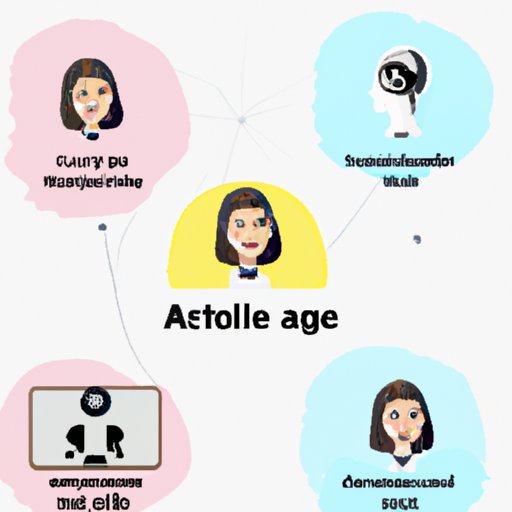Introduction
Artificial intelligence (AI) is rapidly transforming many aspects of our lives, from healthcare to transportation. It’s no wonder that AI has now made its way into the education sector. AI has the potential to revolutionize the way we teach and learn. But what does this mean for teachers? Will AI eventually replace them altogether? In this article, we’ll explore the potential implications of using AI in education, examining both the pros and cons, as well as the ethical implications.

Examining the Pros and Cons of AI Replacing Teachers
The potential of AI replacing teachers is a hotly debated topic. On one hand, there are those who argue that AI can improve learning outcomes by providing personalized instruction and automating some teaching tasks. On the other hand, there are those who worry that AI will reduce the human connection between teachers and students and diminish accountability. Let’s take a closer look at the pros and cons of AI replacing teachers.
Pros
One of the main advantages of AI replacing teachers is increased efficiency. AI-enabled systems can process large amounts of data quickly and accurately, allowing teachers to focus on more meaningful activities like lesson planning and classroom management. AI could also lead to cost savings, since it could automate some of the more mundane tasks associated with teaching, such as grading and record keeping.
In addition, AI could potentially improve learning outcomes. AI-driven feedback loops, AI-assisted classroom management, and AI-enhanced personalized learning could all help to create more engaging and effective learning experiences for students.
Cons
On the other hand, there are several potential drawbacks to using AI to replace teachers. One of the main concerns is the lack of human connection. While AI-enabled systems may be able to provide personalized instruction, they lack the ability to truly connect with students on an emotional level. This could potentially lead to decreased engagement and motivation.
Another concern is decreased accountability. Without a human teacher present to monitor students’ progress and ensure they stay on track, there is a risk that students could fall behind without anyone noticing. Finally, there are ethical implications to consider. AI systems are only as good as the data they are fed, so there is a risk that biased or inaccurate data could lead to biased or inaccurate results.

Exploring the Impact of AI on Education
Despite the potential drawbacks, AI has the potential to revolutionize education in a number of ways. One of the main benefits is increased access to personalized learning. AI-enabled systems can quickly analyze student data and provide tailored instruction based on individual needs, allowing students to move through material at their own pace.
In addition, AI can automate some educational tasks, such as grading assignments and generating reports. This could free up valuable time for teachers and allow them to focus on more meaningful activities. AI can also help teachers to identify patterns in student behavior and intervene when necessary.
Finally, AI can help teachers to teach more effectively. AI-driven feedback loops can provide real-time analysis of student performance, allowing teachers to adjust their instruction accordingly. AI-assisted lesson planning can help teachers to create more engaging and effective lessons. And AI-enabled assessment tools can help teachers to track student progress and identify areas of improvement.

Exploring the Role of AI in Improving Learning Outcomes
AI has the potential to significantly improve learning outcomes. AI-driven feedback loops can provide real-time analysis of student performance, allowing teachers to make adjustments to their instruction as needed. AI-assisted classroom management can help teachers to identify patterns in student behavior and intervene when necessary. And AI-enhanced personalized learning can help students to move through material at their own pace.
How AI is Changing the Way We Teach
In addition to improving learning outcomes, AI is also changing the way we teach. Automation of some teaching tasks can free up valuable time for teachers, allowing them to focus on more meaningful activities. AI-assisted lesson planning can help teachers to create more engaging and effective lessons. And AI-enabled assessment tools can help teachers to track student progress and identify areas of improvement.
Investigating the Ethical Implications of AI Replacing Teachers
As with any technology, there are ethical implications to consider when using AI to replace teachers. Privacy concerns are a major issue, as AI-enabled systems have access to large amounts of personal data. There is also a lack of oversight when it comes to AI systems, which could lead to errors or misuse. Finally, there is a potential for bias if the data used to train the AI system is not representative of the population.
Conclusion
In conclusion, while AI has the potential to revolutionize education and improve learning outcomes, there are still many questions surrounding its use in the classroom. On one hand, AI could lead to increased efficiency, cost savings, and improved learning outcomes. On the other hand, there are potential drawbacks, such as lack of human connection, decreased accountability, and ethical implications. Ultimately, the decision to use AI in the classroom should be carefully considered, taking into account the potential pros and cons, as well as the ethical implications.
(Note: Is this article not meeting your expectations? Do you have knowledge or insights to share? Unlock new opportunities and expand your reach by joining our authors team. Click Registration to join us and share your expertise with our readers.)
